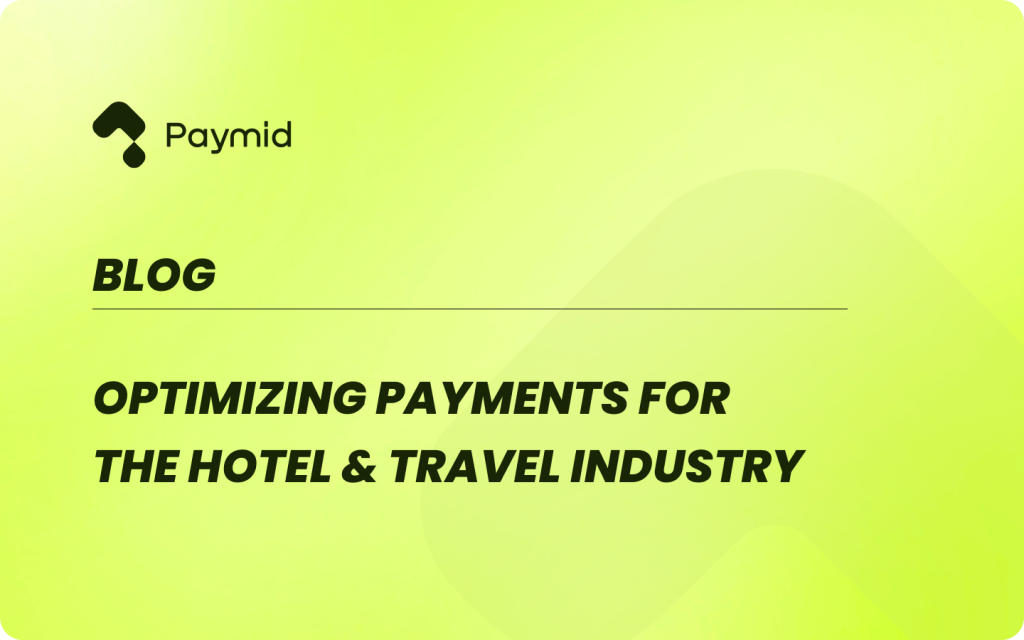Optimizing Payments in the Hotel and Travel Industry

The hotel and travel industry thrives on seamless transactions, yet payment processes can make or break customer experiences and operational efficiency. With global travelers expecting convenience, security, and flexibility, companies must optimize their payment systems to stay competitive. This post explores key trends, challenges, and actionable strategies for enhancing payment processes in this dynamic sector.
The State of Payments in Travel and Hospitality
The travel industry is a financial juggernaut, with global tourism spending projected to surpass $2 trillion annually by 2030. Payments are the backbone of this ecosystem, spanning hotel bookings, airline tickets, car rentals, and on-site services. However, the industry faces unique challenges:
-
High Transaction Volumes: Hotels and travel agencies handle thousands of transactions daily, often across multiple currencies.
-
Global Customer Base: Travelers from different regions use diverse payment methods, from credit cards to digital wallets.
-
Fraud Risks: Cross-border transactions and online bookings increase exposure to fraud, with the industry losing billions annually.
-
Complex Ecosystems: Payments involve multiple stakeholders—OTAs (Online Travel Agencies), payment gateways, banks, and merchants—complicating reconciliation and fee structures.
-
Customer Expectations: Modern travelers demand fast, secure, and flexible payment options, with 68% abandoning bookings due to cumbersome checkout processes.
Emerging trends are reshaping the landscape. Contactless payments, mobile apps, and Buy Now, Pay Later (BNPL) options are gaining traction. Cryptocurrency adoption is also on the rise, with 14% of travelers open to paying with digital currencies, according to recent surveys.
Challenges to Overcome
To optimize payments, companies must address several pain points:
-
Fragmented Payment Systems: Legacy systems often lack integration with modern platforms, leading to inefficiencies and errors.
-
High Processing Fees: Credit card fees, cross-border charges, and OTA commissions can erode margins.
-
Regulatory Compliance: Adhering to PCI DSS, GDPR, and regional regulations requires robust systems and constant updates.
-
Fraud and Chargebacks: High-value bookings are prime targets for fraud, while chargebacks can cost businesses significant revenue.
-
Poor User Experience: Lengthy checkout processes or limited payment options frustrate customers, driving cart abandonment.
Strategies for Optimizing Payments
To address these challenges and capitalize on trends, travel and hospitality companies can adopt the following strategies:
1. Embrace Diverse Payment Methods
Travelers expect flexibility. Offering a mix of payment options—credit/debit cards, digital wallets (e.g., Apple Pay, Google Pay), BNPL services (e.g., Klarna, Affirm), and even cryptocurrencies—caters to varied preferences. For instance, integrating Alipay and WeChat Pay can attract Chinese travelers, who account for a significant share of global tourism spending.
Actionable Steps:
-
Partner with payment gateways like Paymid that support multiple methods.
-
Enable local payment methods (e.g., iDEAL in the Netherlands, UPI in India) to reduce friction.
-
Pilot cryptocurrency payments for tech-savvy customers.
2. Streamline Checkout Processes
A smooth checkout experience reduces abandonment. Simplifying forms, enabling one-click payments, and offering guest checkouts can boost conversions. Mobile-optimized interfaces are critical, as 60% of travel bookings are made on smartphones.
Actionable Steps:
-
Implement auto-fill for returning customers using secure tokenization.
-
Minimize form fields and use progress bars to guide users.
-
Test checkout flows regularly to identify and fix bottlenecks.
3. Enhance Security and Compliance
Security builds trust. Robust fraud detection and compliance with standards like PCI DSS and GDPR are non-negotiable. Advanced technologies like AI and tokenization can mitigate risks without compromising speed.
Actionable Steps:
-
Use AI-powered fraud detection tools to flag suspicious transactions in real time.
-
Implement 3D Secure protocols for high-risk transactions.
-
Encrypt payment data and conduct regular security audits.
4. Optimize for Cross-Border Transactions
International travelers expect transparent pricing and minimal fees. Dynamic currency conversion (DCC) and multi-currency pricing can enhance trust and reduce cart abandonment.
Actionable Steps:
-
Offer DCC to let customers pay in their home currency.
-
Partner with processors that offer competitive foreign exchange rates.
-
Display all fees upfront to avoid surprises.
5. Leverage Data and Analytics
Payment data offers insights into customer behavior, preferences, and fraud patterns. Analyzing this data can inform pricing strategies, marketing campaigns, and risk management.
Actionable Steps:
-
Use analytics platforms to track payment success rates and identify drop-off points.
-
Segment customers by payment method to tailor promotions (e.g., discounts for digital wallet users).
-
Monitor chargeback trends to refine fraud prevention strategies.
6. Integrate with Modern Payment Platforms
Legacy systems are costly and inflexible. Cloud-based payment platforms offer scalability, real-time reporting, and integration with booking engines, PMS (Property Management Systems), and CRMs.
Actionable Steps:
-
Migrate to platforms like Paymid for seamless integrations.
-
Automate reconciliation to reduce manual errors.
-
Use APIs to connect payment systems with OTAs and loyalty programs.
7. Reduce Processing Costs
High fees can erode profits. Negotiating better rates, bypassing intermediaries, and adopting cost-effective technologies can improve margins.
Actionable Steps:
-
Compare processor fees and negotiate lower rates based on transaction volume.
-
Use direct integrations with banks to reduce reliance on OTAs.
-
Explore blockchain-based payment systems for lower-cost cross-border transfers.
8. Prioritize Customer Support
Payment issues can sour customer experiences. Offering 24/7 support and clear refund policies builds loyalty.
Actionable Steps:
-
Provide multilingual support for international customers.
-
Automate refund processes for faster resolutions.
-
Use chatbots to handle common payment queries instantly.
Case Studies
-
Marriott International: By integrating digital wallets and contactless payments across its properties, Marriott reduced checkout times by 30% and increased guest satisfaction scores.
-
Expedia: Expedia’s adoption of BNPL options led to a 15% uplift in bookings among younger travelers, who value flexible payment plans.
-
Airbnb: Airbnb’s use of AI-driven fraud detection cut fraudulent transactions by 25%, saving millions annually.
The Future of Payments in Travel
The payment landscape is evolving rapidly. Biometric payments (e.g., facial recognition), embedded finance, and decentralized payment networks are on the horizon. Companies that invest in scalable, customer-centric payment systems today will be better positioned to adapt to tomorrow’s innovations.
Conclusion
Optimizing payments in the hotel and travel industry requires a blend of technology, customer focus, and strategic partnerships. By offering diverse payment methods, streamlining processes, enhancing security, and leveraging data, companies can boost conversions, reduce costs, and delight travelers. In a competitive market, a seamless payment experience isn’t just a nice-to-have—it’s a must-have.

